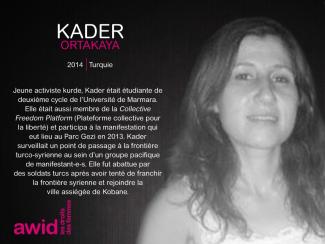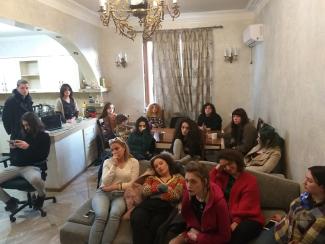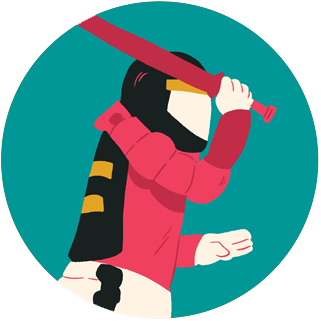-
Autonomie Financière, le Briseur du Silence
ORGANISATION DES FEMMES AFRICAINES DE LA DIASPORA (OFAD) ASSOCIATION LES PETITES MERES PRODADPHE ASSOCIATION AMBE KUNKO (AAK)
-
Contribution des organisations féministes dans la lutte contre l'extrémisme violent au Niger
Femmes Actions et Développement (FAD)
-
Autofinancement: les femmes à l'épreuve des banques à domicile
Rassemblement des Femmes pour le développement endogène et solidaire RAFDES
-
Alimentation et souveraineté alimentaire des femmes rurales
Association Song-taaba des Femmes Unies pour le Développement (ASFUD)
-
Leaders féministes, engagées à investir la masculinité positive, dans la construction d’un nouvel ordre social équilibré, au niveau des localités de la Région du Cavally, Ouest de la Côte d’Ivoire : Comment opérer le changement des mentalités ?
Une societe cooperative, la chefferie traditionnelle des localites, les autorites administratives et les autres associations feminines ONG Centre Solidarite "Investir dans les Filles et les Femmes
-
Co-creation d'une méthodologie de marrainage
NEGES MAWON
-
Millénium d'opportunités pour la sauvegarde de la terre (MOST) par l'appui à la justice climatique des communautés locales et autochtones du bassin du Congo
Jeunesse Congolaise pour les Nations Unies (JCNU), Association Genre et Environnement pour le Développement (AGED)
-
Imaginer une politique féministe queer asiatique
ASEAN Feminist LBQ Womxn Network Sayoni
-
Soutenir l'autogestion: les doulas, les accompagnantes et les réseaux de soutien à l'avortement
inroads
-
Féminismes en ligne: Comment les femmes se réapproprient la technologie
Feminism In India
-
Un comité pour l'élimination des discriminations envers les travailleurs et travailleuses du sexe
Asia Pacific Network of Sex Workers (APNSW), The International Women's Rights Action Watch Asia Pacific (IWRAW AP)
-
Pour un leadership et des organisations féministes durables : partage d'expériences individuelles et collectives
HER Fund, Institute for Women's Empowerment (IWE) ,Kalyanamita, AAF
-
Réalités des Caraïbes : La radio Black Sauna
WE-Change Jamaica
-
Les lignes d'assistance téléphonique pour les femmes
Generation Initiative for Women and Youth Network (GIWYN),Youth Network for Community and Sustainable Development (YNCSD), Community Health Rights Network (CORENET)
-
La sensualité comme forme de résistance : un atelier corporel
UHAI EASHRI
-
Discothèque lesbienne d'Europe de l'Est
Sapfo Collective
-
FitcliqueAfrica: des séjours pour concrétiser des utopies féministes, guérir des traumas, apprendre l'auto-défense
FitcliqueAfrica (Fitclique256 Uganda Limited)
-
Communication Queer pour un Internet Libre
Astraea Lesbian Foundation for Justice
-
Votre manière de considérer la santé sexuelle et reproductive est-elle biaisée par du validisme? Des bonnes pratiques pour inclure les personnes handicapées dans ces politiques
Asia Pacific Network of Women with Disabilities and Allies
-
Décoloniser la Communication Non Violente
API Equality-LA, Sayoni, ASEAN Feminist LBQ Womxn Network
-
Des approches féministes pour engager des poursuites judiciaires contre le harcèlement au travail
Women's Legal Centre
-
Femmes en situation de conflit au Myanmar
Women's League of Burma, Rainfall
-
Espaces féministes des Carïbes, expressions créatives et pratiques spirituelles pour la transformation des communautés
CAISO: Sex and Gender Justice
-
POP-UPS : Le pouvoir juste. Des outils d'éducation populaire pour un futur féministe
JASS/Just Associates
-
NonAnonyme : Rendre les pratiques féministes de la diaspora africaine noire sur la sobriété plus "queer"
-
Sorcellerie digitale: La pensée magique pour des horizons cyberféministes
The Digital Witchcraft Institute
-
Élaborer des manifestes pour les femmes : les revendications des femmes de terrain pour le changement dans la région Asie-Pacifique
Asia Pacific Forum on Women Law and Development
-
Concevoir vos voyages astraux
EuroNPUD, narcofeminists as a loose group
-
Soins collectifs
RENFA Rede Nacional de Feministas Antiproibicionistas
-
Musique de nos mouvements
Radical imagination
-
Transformer des déchets en charbon de bois écologique
KEMIT ECOLOGY SARL
-
Soins collectifs et rébellion des mouvements féministes antiracistes dans des contextes autoritaires et violents
CFEMEA - Feminist Center of Studies and Advisory Services, CRIOLA - black women`s organization, Iniciativa Mesoamericana de Mujeres Defensoras
-
Briser les carcans religieux et patriarcaux du droit de la famille qui impactent nos vies #FreeOurFamilyLaws
Musawah
-
Approche féministe pour la revendication des droits fonciers
Badabon Sangho, APWLD
-
La grève mondiale des femmes : Notre résistance, notre futur
Asia Pacific Forum on Women, Law & Development, ESCR-Net, Women's March Global
-
Pour une « Terre Mère » inclusive
Disability Rights Fund, Open Society Foundation
-
De l'inclusion à l'infiltration : Stratégies pour créer de véritables organisations féministes intersectionnelles
Mobility International USA (MIUSA)
-
Les histoires cachées de femmes porteuses de handicaps invisibles : l'Art en action
The Red Door, Merchants of Madness, Improving Mental Wellbeing through Art
-
Partenariats publics-privés et droits humains des femmes : Leçons tirées d'études de cas de pays du Sud
Development Alternatives with Women for a New Era (DAWN)
-
Voyage interconnecté : nos corps, notre science-fiction !
The Interconnected Journey Project, Laboratorio de Interconectividades
-
Compiler et construire : vision féministe pour contester l'ordre économique mondial dominant
IWRAW Asia Pacific
-
L'auto-publication comme acte de résistance féministe
International Women* Space
-
Bonnes pratiques de protection juridique pour les minorités sexuelles et de genre au Pakistan
Activists Alliance Foundation, Khawja Sirah Society, Wajood Society, Wasaib Sanwaro
-
Approches féministes pour lutter contre le traffic d'être humains
IWRAW Asia Pacific, Business & Human Rights Resource Center
-
Critique de l'individualisme et des politiques étatiques : mobilisation internationale contre les violences ciblées
Masaha: Accessible Feminist Knowledge
-
Décoloniser l'intimité : comment les identités queer défient les structures familiales hétéronormatives
WOMANTRA
-
Yeki Hambe - Le théatre des travailleurs et travailleuses du sexe
Sex Worker Education and Advocacy Task Force
-
Créer une réalité féministe autochtone : Honorer le féminin sacré et ouvrir de nouvelles voies pour les femmes autochtones
Cultural Survival, International Funders in Indigenous Peoples
-
Femmes brésiliennes contre la prohibition
Mulheres Cannabicas, Tulipas do Cerrado
-
Commission pour la vérité féministe noire : tenir compte des injustice pour révolutionner le féminisme intersectionnel
Black Women in Development
-
Le soin communautaire c'est aussi prendre soin de soi : les vraies histoires se racontent dans des espaces de confiance
Eurasian Harm Reduction Association, Metzineres, Urban Survivor’s Union, Salvage women and children from drug abuse
-
Pas de mouvement interdit : danser les liens entre droits sexuels et ceux des personnes handicapées et trans pour contrer la violence
National Forum of Women with Disabilities, Autonomy foundation, Nazyk kyz
-
L'impact de l'accaparemment du pouvoir par les entreprises sur les réalités féministes: développer des outils pour l'action
ESCR-Net | Economic, Social, Cultural Rights Network
-
Réimaginer le SIDA : élaborer une stratégie féministe face au VIH
Frontline AIDS, Aidsfonds, IPPI (Indonesian Network of Women Living with HIV), UHAI-EASHRI (East African Sexual Health and Rights Initiative)
-
Faire progresser la justice économique pour concrétiser notre vision d'un monde féministe
International Network for Economic, Social and Cultural Rights, ESCR-Net
-
Café des travailleurs et travailleuses du sexe
Hydra e.V.
-
Approche écoféministe du changement climatique et de la sécurité alimentaire
Umphakatsi Peace Ecovillage, Human Rights Educational Centre
-
Relier les actions locales et internationales : l'expérience d'une mobilisation innovante par les travailleurs et travailleuses du sexe en Europe
International Committee on the Rights of Sex Workers in Europe, STRASS - French Sex Worker Union, APROSEX, Red Edition
-
Faire l'expérience d'une innovation technologique qui peut renforce notre sécurité lorsque nous circulons dans l'espace public
Soul City Institute for Social Justice, Safetipin, Womanity Foundation
-
Les hiérarchies dans nos organisations sont-elles NON-féministes?
Gay and Lesbian Coalition of Kenya National, Gay and Lesbian Human Rights Commission
-
Nous sommes tous et toutes différent.e.s mais nous partageons des valeurs communes
UNWUD (Ukrainian network of women who use drugs), JurFem Association, Women's Prospects
-
Un monde sans classes
Bunge La Wamama Mashinani (Grassroots Women's Parliament)
-
Les femmes renforcent le pouvoir des communautés
Institute for Women's Empowerment (IWE), Solidaritas Perempuan, ASEC Indonesia, Komunitas Swabina Pedesaan Salassae (KSPS)
-
Organisations féministes et leadership transformationnel : Les travailleuses en Amérique latine créent un mouvement ouvrier féministe
Solidarity Center
-
Féminisme et handicap : théatre participatif pour décoloniser les récits qui stigmatisent
Rising Flame, National Indigenous Disabled Women Association, Nepal, The Spectrum & Union of Abilities, The Red Door
-
Donner de la valeur et ancrer le repos, le plaisir et le jeu
ATHENA Network
-
Le projet de jugement féministe africain
The Initiative for strategic Ligation in Africa (ISLA)
-
Voix du front : renforcer le pouvoir collectif pour mettre fin à l'incarcération des femmes dans le monde
International Drug Policy Consortium, Equis Justicia para las Mujeres, National Council for Incarcerated and Formerly Incarcerated Women and Girls, Women and Harm Reduction International Network
-
Activisime des jeunes queer : pour une ère de droits humains et de développement durable
African Queer Youth Initiative, Success Capital Organisation
-
Nos luttes, nos histoires, nos ressources
Oriang Lumalaban, Pambansang Koalisyon ng Kababaihan sa Kanayunan
-
Asie du Sud-Est : Franchir les obstacles pour une action autochtone collective pour le climat
Cuso International, Asia Indigenous Peoples' Pact
-
Dépasser l'amour romantique pour renforcer la justice sociale et l'amour au sein de la communauté
Eurasian Women's Network on AIDS
-
Intersexualité et féminisme
Intersex Russia
-
Comprendre les expériences et les besoins en matière de santé reproductive des personnes de diverses identités de genre
Asia Pacific Transgender Network (APTN)
-
Conversations sur la mobilisation contre le VIH comme un espace de discrimination
Because We Care Collaborative
-
Le Manifeste des systèmes alimentaires du Mississippi
Center for Ideas, Equity & Transformative Change, National Council of Appropriate Technology - Gulf South, MS Food Justice Collaborative, Malcolm X Grassroots Movement
-
Coprésidence du mouvement des femmes kurdes comme exemple de féminisme radical abouti
The Free Women’s Movement (TJA)
-
Infortunes : Marcher sur des oeufs
Eldoret Women For Development (ELWOFOD), Mama Cash, Young women against Women Custodial Injustices Network
-
LIBERTÉ
-
La prison n'est pas féministe : explorer l'impact et les alternatives à la police et à l'incarcération
Migrant Sex Workers Project, Showing Up For Racial Justice
-
La société Bondo : pour des rites de passage sans mutilations en Sierra Leone
Purposeful
-
Terres et territoires libérés : Un dialogue panafricain
Thousand Currents (USA), Abahlali baseMjondolo (South Africa), Nous Sommes la Solution (west Africa/regional), Movilización de Mujeres Negras por el Cuidado de la Vida y los Territorios Ancestrales (Colombia), and Articulation of Black Rural Quilombola Communities (Brazil)
-
L'éducation populaire et la mobilisation pour une économie féministe
Jamaica Household Workers Union (JHWU), United for a Fair Economy, Centro de Trabajadores Unidos en la Lucha (CTUL)
-
Se mobiliser avec un portefeuille vide? C'est possible !
Breakthrough India
-
Partage d'expériences autour de la création d'un réseau pour les femmes défenseuses des droits humains en Afrique de l'Est : L'expérience ougandaise
Women Human Rights Defenders Network Uganda
-
Clinique technologique
Stichting Syrian Female Journalists Netowrk
-
Construire des mouvements inspirants : Dépasser le stade de la représentation symbolique
Rising Flame
-
Justice et guérison pour les survivant·e·s de violences basées sur le genre: un débat interactif sur la justice resaurative et sur l'anatomie du pardon
One Future Collective
-
Actions collectives pour mettre un terme à la transphobie : une perspective féministe
Asia Pacific Transgender Network, Iranti, Transgender Europe
-
Femmes lesbiennes, bisexuelles et queer et demande d'asile
Sehaq
-
Avortement et handicap : vers une approche intersectionnelle fondée sur les droits humains
Women Enabled International
-
Apprendre à soutenir l'auto-gestion de communautés de personnes sans papiers, migrantes, travailleuses du sexe et criminalisées
Buttrerfly (Asian and Migrant Sex Workers Support Network)
-
Le souci de soi : un outil fondamental pour la durabilité des mouvements féministes et LGBTQI
United and Strong Inc., S.H.E Barbados, Lez Connect
-
Donner la place aux voix, aux réalités et au pouvoir collectif des jeunes féministes en faveur de la justice climatique
Young Feminist organization Gasy Youth Up, Young African Feminist Dialogues
-
Femmes solidaires et en action : incarner nos réalités (Asie et Afrique)
Women Performing the World (Asia/Africa)
-
Défier le patriarcat : les travailleurs et travailleuses dans le secteur des loisirs et du divertissement
Women Forum for Women in Nepal (WOFOWON)
-
Non-citoyennes: la question de la citoyenneté des femmes dans le contexte des communautés migrantes et vulnérables en Asie du Sud
NEthing
-
Visualiser comment faire entendre nos voix dans le contexte de la crises climatique et migratoire
Women's Refugee Commission, The Feminist Humanitarian Network, ActionAid
-
Dans le même bateau : les fonds pour les femmes et les mouvements de femmes cocréent des réalités féministes
Mama Cash, Global Fund for Women, Urgent Action Fund - Africa
-
Co-création de magie avec des mouvements de jeunes féministes : pratiques participatives qui inspirent la joie
Feminist organizing, FRIDA The Young Feminist Fund (Community), Teia
-
Droit de protection de femmes vivant des réalités difficiles : le cas de 3 organisations de femmes de communautés marginales
NGO Asteria, Ermolaeva Irena and Bayazitova Renata. NGO Ganesha Musagalieva Tatiana. NGO Ravniy Ravnomu Kucheryavyh Tanya
-
Feminnale (biennale féministe) - Les traditions contre l'art et les formes d'expression
Bishkek Feminist Initiatives
-
Résistance grâce au savoir, aux arts et à l'activisme : création d'une bilbliothèque féministe en Arménie
FemHouse, Armenia
-
À la conquête du système onusien grâce à des stratégies féministes (il ne faut pas être avocat.e pour s'amuser)
Kazakhstan Feminist Initiative "Feminita", IWRAW Asia Pacific, ILGA World
-
Les données, à quoi ça sert ? Vers des données élaborées d'une perspective féministes pour répondre à nos besoins !
International Women's Development Agency, Women's Rights Action Movement, Fiji Women's Rights Movement
-
Criminalisation de la voix, du leadership et de l'influence des femmes sur les lois, les politiques et les pratiques au Kenya
Keeping Alive Societies Hope-KASH, Katindi Lawyers and Advocates, Vocal Kenya
-
De la Colombie vers le monde, la force de changement des femmes africaines
Proceso de Comunidades Negras en Colombia -PCN, Solidarité Féminine por la Paix el le Develppment Integral -SOFEPADI,
-
Salon d"écoute AfroQueer et stand d'enregistrement d'histoires
AQ Studios, None on Record, AfroQueer Podcast
-
Revendiquer l'intégrité corporelle
GBV Prevention Network : Coordinated by Raising Voices
-
Apprenons de la diversité
Circulo de Mujeres con Discapacidad -CIMUDIS, Alianza Discapacidad por nuestros Derechos -ADIDE, Fundación Dominicana de Ciegos -FUDCI, Filial Puerto Rico de Mujeres con Discapacidad
-
Le football comme outil féministe
Fundación GOLEES (Género, Orgullo, Libertad y Empoderamiento de Ellas en la Sociedad)
-
Constellations migrantes
LasVanders
-
Dialogues écoféministes pour la défense
CIEDUR (Centro Interdisciplinario de Estudios sobre el Desarrollo), Equit, Foro permanente de Manaos y Amazonia
-
Le mouvement «La Frida Bikes»
La Frida Bike
-
Sorcellerie, chamanisme et autres savoirs insurrectionnelles contre le patriarcat.
Colectiva Feminista MAPAS-Mujeres Andando Proceso por Autonomías Sororales
-
Expériences, apprentissages et défis relatifs à la gestion de la sécurité holistique des organisations horizontales féministes et de la dissidence liée à l'identité de genre en période de crise sociale et politique. L'expérience du soulèvement populaire du 18 octobre au Chili.
Fudación Comunidades en Interfaz
-
La nourriture que nous connaissons tou·te·s
Las Nietas de Nonó, Parceleras Afrocaribeñas por la Transformación barrial (PATBA)
-
Pratiques de résistance des femmes autochtones du Pérou et du Guatemala face au changement climatique
Thousand Currents, Red de Mujeres Productoras de la Agricultura Familiar, Asociación de Mujeres Ixpiyakok (ADEMI, Ixpiyakok Women's Association)
-
Construire des villes féministes
CISCSA, Articulacion Feminista Marcosur
-
Mets-toi à ma place
Alianza Discapacidad por nuestros Derechos - ADIDE, Circulo de Mujeres con Discapacidad -CIMUDIS
-
Déblayer la voie pour que les femmes puissent vivre pleinement, guérir les traumatismes collectifs et historiques
Grupo de Mujeres Mayas Kaqla
-
Des femmes autochtones zapotèques défiées par la nature
-
Foyers de soins et de réparation pour les défenseuses des droits humains dans le cadre de l'approche d'une protection intégrale féministe : une réalité féministe
Iniciativa Mesoamericana De Defensoras de Derechos Humanos, Consorcio Oaxaca para el Diálogo Parlamentario y la Equidad A.C, Red Nacional De Defensoras De Derechos Humanos en Honduras, Coletivo Feminista de Autocuidado
-
Guérir ta voix de licorne : tisser des technologies ancestrales et digitales pour aiguiser la langue
-
Pistes féministes vers un protocole de maternité assistée pour les femmes en situation de handicap
Circulo emancipador de mujeres y niñas con discapacidad de Chile, CIMUNIDIS, WEI
-
Ecole pour enfants trans féministes
Fundación Selena
-
REDTRASEX: Expérience d'organisation et de lutte pour les droits des travailleuses du sexe d'Amérique Latine et des Caraïbes
RedTraSex Red de mujeres trabajadoras sexuales LAC
-
Violence de genre dans le monde du commerce du sexe
Brigada Callejera de Apoyo a la Mujer, "Elisa Martínez", A.C., Red Mexicana de Organizaciones Contra la Criminalización del VIH. Red Mexicana de Trabajo Sexual
-
La migration nous oblige à tracer notre chemin au fur et à mesure que nous marchons
Asociación de Trabajadoras del Hogar a Domicilio y de Maquila. ATRAHDOM
-
Nouveaux récits pour les femmes noires : corps, guérison et plaisir.
-
Tisser des souvenirs et des réseaux - Les féministes noires renforcent les féminismes noirs en Amérique latine et aux Caraïbes
Red de Mujeres Afrolatinoamericanas, Afrocaribeñas y de la Diáspora, Articulação de Organizações de Mulheres Negras Brasileiras (AMNB), Voces Caribeñas











